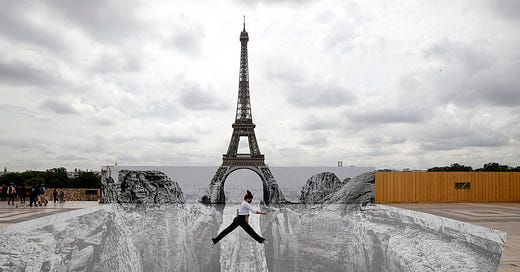Top 5: Time [as we know it] isn't real?
Plus: political sectarianism, friendship, and the new American narratives

The Top 5 articles for your week:
“The Tyranny of Time” (Noema Magazine)
Because we could probably pull out about 30 quotes from this article on how we’ve come to measure time by clocks.
The religious fervor for rationing time and disciplining one’s life around it led the American historian Lewis Mumford to describe the Benedictine monks as “perhaps the original founders of modern capitalism.” It is one of the great ironies of Christianity that it set the wheels in motion for an ever-unfolding mania of scientific accuracy and precision around timekeeping that would eventually secularize time in the West and divorce God, the original clockmaker, from the picture entirely.
“The Lab-Leak Theory: Inside the Fight to Uncover COVID-19’s Origins” (Vanity Fair)
Because we really should be asking ourselves why this particular theory couldn’t be taken seriously — and how we could have (or should have?) known to take it seriously in an age of conspiracy theories and disinformation.
“How America Fractured Into Four Parts” (The Atlantic)
Because in an excerpt from George Packer’s new book, he’s splits the US into four distinct “Americas” — Free America, Smart America, Real America, and Just America. Think of these four parts as distinct narratives or “national myths” that are causing much of the division on the idea of the US.
“Is There a Way to Dial Down the Political Hatred?” (NYT)
Because this op-ed proposes the solutions of dialogue, moderation, relationship to political sectarianism in the US. I have a ton of questions flying through my head with this essay, and it pairs really well with the Packer essay above. Molly Worthen has been so good for so long.
“What did COVID do to friendship?” (New Yorker)
Because “the pandemic reoriented our economy of attention, especially online, re-clarifying the limits of who and what we could care about.”
ICYMI: Michael wrote about “The Fixer” gospel and how it affects Christian politics several days ago. You can read it here.




Thanks for the comments and your writing.
Your comments on the Covid lab-leak theory article are interesting.
I think liberals (using that term loosely) missed the mark on that issue by being too reactionary to whacko views (case of "throwing the baby out with the bathwater") and also by having an overly narrow, reductionist view applied to the world and also placing too much of a sort of moral trust in our public institutions.
They frankly run the risk of making the same mistakes yet again with regard to some of the legitimate concerns right now coming out around vaccine safety and the efficacy of non-vaccine (or non mRNA) based treatments to covid.
Understand that are world is extremely complex and becoming increasingly so, responses to things have effects and consequences (for instance the vaccine, gain of function research). Liberals with a humanities background or those in policy should at least be aware of systems thinking and the basics of complex systems and effects to better understand the realities we're in.
A more scientific understanding or at least familiarity would be helpful in framing how we ought to think about issues (at least partially).
Also understand that like it or not, Western institutions are mostly in a full blown crisis of legitimation, caused in part by perverse economic incentives taking the place of actual objective science, something called "regulatory capture" , and other related phenomena. The contemporary critical theorist Habermas has written and thought much on this topic.
Public and private institutions will frankly need to be more morally transparent, honest, and ethical in the new era if they want to restore public trust and legitimacy (and also function better and more efficiently).